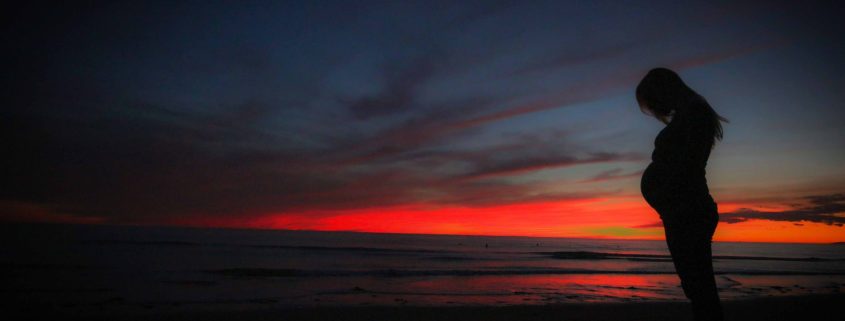Breast Cancer and Pregnancy: What You Need to Know

Below, we’ll go over answers to some common questions:
- Does pregnancy affect breast cancer risk and survival? Can pregnancy cause breast cancer?
- How do I treat breast cancer if I’m pregnant?
- Are there risks getting pregnant after breast cancer? What happens with breast cancer and pregnancy after 40?
That said, the following content does not constitute medical advice. Every pregnancy is different, along with every case of breast cancer. You should speak with your doctor if you are concerned about breast cancer and pregnancy.
Contents
Pregnancy and Your Breast Cancer Risk
There is a complex relationship between breast cancer and pregnancy. Significant hormonal changes occur during pregnancy and these affect the breast. Here are some quick facts:
- Having your first child at age 35 or younger decreases the lifetime risk of breast cancer in most, but slightly increases the risk in the following 10 years. The younger a woman is when she has her first child, the lower her risk of breast cancer.
- Having only one child over the age of 35 slightly increases the risk of breast cancer, compared to younger mothers and nulliparous women (those who have not given birth).
- Each additional child further decreases the risk of breast cancer.
- Breastfeeding has a protective effect against breast cancer, and the benefit increases with the length of feeding.
Additionally, a breast cancer diagnosis during pregnancy is rare and more difficult to diagnose due to dense breast tissue during pregnancy. According to Cancer Research UK:
Breast cancer is reported in 1 in every 3,000 pregnancies. Most women are between 32 and 38 years old at diagnosis. Most are able to carry on with their pregnancy.
The good news is, being diagnosed with breast cancer during pregnancy was found to not affect 10-year survival rates.
See also: Can I Breastfeed with Breast Implants?
Getting Pregnant After Breast Cancer
Research suggests that having a baby after breast cancer treatment is safe — in fact, it may improve the survival rates in many women, even in estrogen receptor-positive breast cancer. However, the timing of conception after breast cancer treatment needs to be considered carefully.
Breast cancer and fertility
Many of the treatments for breast cancer can reduce fertility. Menopause may be brought on by chemotherapy, or hormone or targeted drug therapies. Pregnancy should be avoided when on hormone therapies, such as Tamoxifen, as they are harmful to the fetus.
Women who have not completed their family when they develop breast cancer should discuss options with their healthcare provider: storing embryos (good success rate, but time-consuming to organize) and storing unfertilized eggs (lower success rate) may be considered. New medication is now available that can effectively shut down the ovaries and reduce the risk of premature menopause; however, the long-term side effects are not fully understood.
See also: 5 Ways to Optimize Your Chance of Getting Pregnant
Early detection
Regular breast examinations throughout a woman’s life are essential in the early detection of breast cancer. Self-examination is important and all pregnant women should have their breasts examined by their obstetrician early in pregnancy, as the breasts quickly become very dense and difficult to examine. Breast examinations should be repeated after delivery.
Some women have a higher risk of developing breast cancer in the reproductive years. The Centers for Disease Control and Prevention lists the following groups as having an increased risk:
- Family history (first degree) of breast or ovarian cancer, especially if under 45 or male breast cancer;
- Ashkenazi Jewish family;
- Previous radiation therapy to chest or breast;
- History of other breast health problems including “lobular carcinoma in situ (LCIS), ductal carcinoma in situ (DCIS), atypical ductal hyperplasia, or atypical lobular hyperplasia;”
- Dense breasts on a mammogram.
Treating Breast Cancer During and After Pregnancy
Experts at Cancer.org explain that treating cancer while pregnant is complicated. There are two goals to treatment: treating the cancer effectively and protecting the developing fetus. Treatment recommendations are highly individualized depending on factors including: the size and location of the cancer, if there are metastases, stage of pregnancy, general maternal health, and maternal preferences.
Termination of pregnancy may be advised, especially if early on and if the cancer is advanced or aggressive, to allow optimization of treatment for the woman. This is an incredibly difficult decision for any woman.
Surgery is relatively safe during pregnancy and may include full mastectomy and lymph node removal, partial mastectomy and breast-conserving surgery (BCS), or lumpectomy. As other treatments are risky during pregnancy, more drastic surgery may be recommended unless in the third trimester, when other treatments can begin immediately after delivery.
Chemotherapy may be indicated after the first trimester and before 35 weeks; however, the long-term effects are not fully understood. Radiation, hormone, and targeted therapy are unsafe in pregnancy, but treatment may begin soon after delivery.
For most women with breast cancer, breastfeeding is not appropriate.
Bottom Line: Research has Led to More Hope
Breast cancer in pregnancy is thankfully uncommon. What used to be a devastating diagnosis, is now much more hopeful. Research in the last 30 years has led to improved understanding of breast cancer in pregnancy and how to treat it. Most women are able to continue with the pregnancy, producing a healthy baby, and are cured of their cancer. Pregnancy and breastfeeding reduce the risk of breast cancer and improve outcomes in women who have had breast cancer.
If you are concerned about your risk for breast cancer, be sure to talk with your doctor. We here at Safe Birth Project wish you the best of luck with your new bundle of joy!
For more articles related to women’s health and pregnancy, see below:








Leave a Reply
Want to join the discussion?Feel free to contribute!